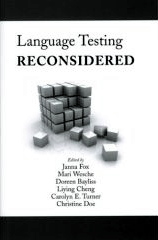
. . . discussions of reliability no longer refer back to Edgeworth (1888, 1890), or of [the] validity of essay-marking to Sir Phillip Hartog (Hartog and Rhodes, 1935, 1936), or of the problem of scaling to the elderly Thorndike's dream of an absolute scale of language proficiency (Monroe, 1939), nor do our criticalists cite the impassioned attacks on the 'encroaching power' of examinations expressed by Henry Latham (1877). (p. 12)
[ p. 17 ]
focus on any one of these approaches . . . to the exclusion of others, will lead to potential weakness in assessment itself, or to limitations on the uses for which the assessment is appropriate. (p. 41)
[ p. 18 ]
A stronger predictor of future academic performance, according to Davis, is present academic performance. This forces us to examine what tests such as the IELTS might in fact be measuring. Reputedly a measure of academic language proficiency, Davies acknowledges that the theoretical underpinning of what is known as "academic English" is somewhat shaky:While academic language is taken for granted as a construct, attempts to describe it as a single domain raise even greater doubts than those which query the unitary nature of academia. Do science, music, the humanities, engineering, and dentistry all share some idea of knowledge and investigation or do we just assume they do because all are studied and researched in universities? And for us, the harder question: do they all have a language in common which is different from other languages? (p. 74)
[ p. 19 ]
The idea behind . . . [national citizenship tests] is the belief that language proficiency, as exemplified through these tests, is an expression of loyalty and patriotism and should be a requirement for residency, and especially for citizenship" (p. 149)
– Reviewed by Tim Newfields
Toyo University
[ p. 20 ]